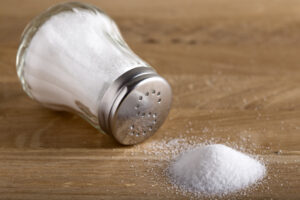 According to a new study published in the Journal of the American College of Cardiology, if you regularly use table salt, you may be at a higher risk of heart disease. So, if you want to keep your heart healthy, limiting your intake of table salt is important.
According to a new study published in the Journal of the American College of Cardiology, if you regularly use table salt, you may be at a higher risk of heart disease. So, if you want to keep your heart healthy, limiting your intake of table salt is important.
Most people love the taste of salt. It’s that amazing flavor that makes everything taste better. But this new study from the School of Public Health and Tropical Medicine at Tulane University in New Orleans suggests that it could have a large effect on two common kinds of heart disease: heart failure and ischemic heart disease (also known as hardening of the arteries).
Advertisement
“Overall, we found that people who don’t shake on a little additional salt to their foods very often had a much lower risk of heart disease events, regardless of lifestyle factors and pre-existing disease,” says co-author Lu Qi, MD, Ph.D.
Researchers also concluded that putting such limits on salt did not affect the stroke risk.
But, there is some good news for salt lovers. The study suggests that you don’t need to eliminate salt altogether. By simply adding less salt to food and not removing it entirely, you can make a significant difference without too big of a sacrifice.
Even people who followed a DASH-style diet were able to lower their blood pressure further and reduce their heart disease risk when they reduced their salt consumption at the table. This study helps to show how understanding food facts is vital to keep the body healthy throughout life.
Previous research has linked high sodium to high blood pressure, which is a major risk factor for cardiovascular disease. However, the evidence over the years has been conflicting because it is difficult for researchers to determine how much salt people have consumed. This new research can help physicians understand the relationship between salt intake and their patient’s risk for heart disease.
Protecting Heart Health as You Age
Keeping the heart strong and healthy is vital for enjoying a high quality of life as you age. Heart Rescue was designed to help support and promote cardiovascular health using a variety of ingredients, including omega-3 fatty acids, CoQ10. The omega-3 fatty acids play an important role in cardiovascular function, while CoQ10 is involved in energy production at the cellular level. These two heart superstars are supported by 5 other ingredients can help to promote and support cardiovascular function as you age. This formula’s health benefits can help strengthen the heart muscle, support circulation, and help reduce the risk of heart disease.
